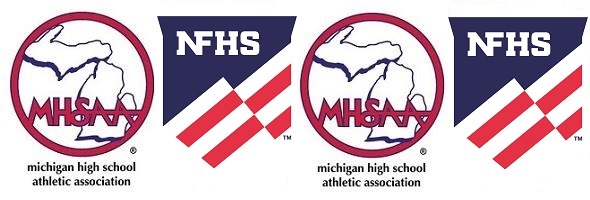
SAC Sound-off: The State of Sportsmanship
April 17, 2012
This week, we asked our MHSAA Student Advisory Council -- made up of athletes representing nearly every sport the MHSAA sponsors -- if they've seen more or less sportsmanship during their high school sports careers.
Here's what they told us:
Good news
“I’ve seen an increase, especially on our golf team because we’ve made that a priority on the team. Also, our school has made it a bigger focus.” – Kalamazoo Hackett junior Abby Radomsky
“An increase most definitely has been seen in the department of sportsmanship throughout my high school career. … Due to the rising levels of leadership and drive shown by students and coaches to display that life skills are taught through sports, not only the sport.” – New Buffalo senior Lena Madison
“I have seen an increase in sportsmanship because I think the whole idea of ‘Good sports are winners’ has had an impact on student athletes.” – Rogers City junior Evan Lamb
“I have seen an increase overall, especially in my area. I have tried to spread the ideas of positive sportsmanship throughout the U.P., and many people have made the change. It’s pretty awesome.” – Rudyard senior Tyler Wilson
“I have seen an increase in sportsmanship because the idea of being a good sport has been brought to the forefront of high school sports by the MHSAA and the SAC.” – Portland St. Patrick junior Elle Lehman
For some right reasons
“As my teammates have matured, I think we have learned more about how crucial having good sportsmanship is to the success of the team.” – Pontiac Notre Dame Prep junior Carly Joseph
“I have seen an increase in sportsmanship because I feel more and more kids are playing for the love of the game and not only to win.” – Muskegon Catholic Central senior Alissa Jones
As athletes grow up
“I have seen an increase throughout my time in high school, mostly because of the increased maturity level and understanding of what is right.” – Grand Blanc senior Bailey Truesdell
“I have seen an increase in sportsmanship. I believe this is because there is an increase in the level of maturity.” – Vandercook Lake junior Thye Fischman
Somewhere in the middle
“I haven’t really noticed a change either way. I have never come in contact with very poor sportsmanship, which is probably why it seems to stay the same.” – Walled Lake Central junior Taylor Krumm
“I haven’t noticed an increase or a decrease in high school sports. I think high school athletes act the same as when I entered high school.” – Travis Clous, Benzie Central senior
Something to consider
“I think a decrease because as students grow up and become more comfortable playing, I think they forget what they have been taught and feel as though they are entitled. I know student that think the older they are, the more they know; so they talk back to coaches and players.” – Maria Buczkowski, Detroit Country Day senior

Adult Fans: HS Sports' Biggest Challenge
August 27, 2019


By Karissa Niehoff, NFHS Executive Director
and Mark Uyl, MHSAA Executive Director
Inappropriate adult behavior at high school athletic events in Michigan has reached epidemic proportion.
When more than 2,000 high school athletic directors were asked in a recent national survey what they like least about their job, 62.3 percent said it was “dealing with aggressive parents and adult fans.”
And the men and women who wear the black and white stripes agree. In fact, almost 80 percent of officials quit after the first two years on the job, and unruly parents are cited as the reason why. As a result, there is a growing shortage of high school officials here in Michigan, and in some sports like wrestling, swimming & diving and track & field, the shortage is severe. No officials means no more games.
If you are a parent attending a high school athletic event this fall, you can help by following these six guidelines:
1. Act Your Age. You are, after all, an adult. Act in a way that makes your family and school proud.
2. Don’t Live Your Life Vicariously Through Your Children. High school sports are for them, not you. Your family’s reputation is not determined by how well your children perform on the field of play.
3. Let Your Children Talk to the Coach Instead of You Doing It for Them. High school athletes learn how to become more confident, independent and capable — but only when their parents don’t jump in and solve their problems for them.
4. Stay in Your Lane. No coaching or officiating from the sidelines. Your role is to be a responsible, supportive parent — not a coach or official.
5. Remember, Participating in a High School Sport Is Not About Getting a College Scholarship. According to the NCAA, only about two percent of all high school athletes are awarded a sports scholarship, and the total value of the scholarship is only about $18,000.
6. Make Sure Your Children Know You Love Watching Them Play. Do not critique your child’s performance on the car ride home. Participating in high school sports is about character development, learning and having fun — not winning and losing.
Purchasing a ticket to a high school athletic event does not give you the right to be rude, disrespectful or verbally abusive. Cheer loud and be proud, but be responsible and respectful. The future of high school sports in Michigan is dependent on you.
The Michigan High School Athletic Association (MHSAA) is one of 51 members of the National Federation of State High School Associations (NFHS).

